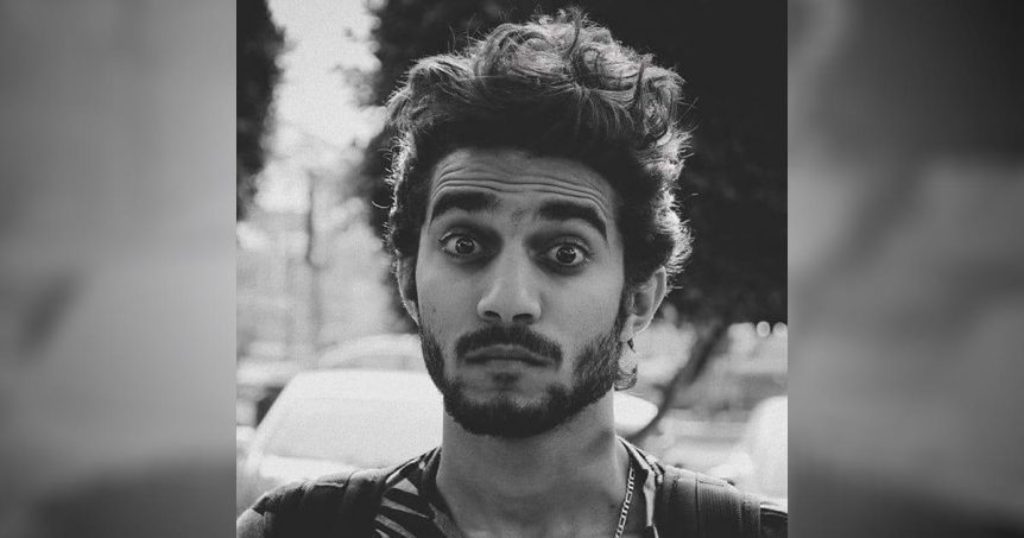On May 1st, 2020, Egyptian filmmaker Shady Habash died in Cairo’s Tora maximum security prison complex. The initial reports didn’t disclose the cause of death or the circumstances surrounding it, but it was later reported that the 24-year-old had accidentally ingested “sanitizing solution” that he mistook for water, according to state-owned newspaper Al Ahram.
In March 2018, Shady was among seven people arrested in connection to a music video he had directed for Rami Essam’s Balaha, a satirical song critical of Egyptian President Abdel Fattah El Sisi. Among those arrested were one social media expert and two musicians who had previously worked with the singer, as well as an Egyptian man who played the song in his car in Kuwait, according to Mada Masr. The song was released ahead of Egypt’s 2018 presidential election, which saw then incumbent President Sisi win by a landslide with 97 percent of the votes.

By the time of his death, Habash had been jailed for over two years for “spreading false news” and “joining a banned organization,” charges he was never convicted of or indeed even tried for.
The Egyptian Front for Human Rights accused judge Mohamed El Said El Sherbeeni of nonfeasance which led to Habash’s temporary detention exceeding two years, the legal limit stipulated in article 143 of Egypt’s criminal procedures code, according to the Egyptian Initiative for Personal Rights (EIPR).
Shady Habash died for exercising his right to freedom of speech and yet his saga and its fatal outcome didn’t inspire the public outrage or prompt the immediate course correction his death deserved. If anything, public apathy has since grown into misdirected outrage as the Ministry of Interior launched a TikTok purge, arresting two of the platform’s most widely followed Egyptian users, Mawada Eladhm and Haneen Hossam.
According to local media, both women are accused of inciting debauchery and are currently detained in the Qanater women’s correctional facility. Additionally, Hossam faces charges of human trafficking and “violating Egyptian family values, as well as creating, running and using social media to facilitate crime,” BBC reports.
@mawadaeladhmاي يا عم ده♬ خلصانه معكم بشياكه – mohamedboda97
In both cases, the charges seem to misrepresent the facts. Hossam’s arrest was preceded by social media uproar after she posted a video to promote her platform on video-sharing social media network Likee, which offers users monetary compensation in exchange for convincing others to sign up to the app.
In the three-minute video, the 20-year-old reportedly told her followers that she was hoping to create a group for girls aged 18 or older to join her platform. Her post prompted outrage from many social media users who accused her of sex trafficking.
Eladhm’s charges are even less clear-cut. In addition to breaking curfew, the young social media mogul was charged with “inciting debauchery” after vice police determined that her clothes are “revealing” and her dance moves are “suggestive.”
The investigation is still ongoing in both cases and it remains to be seen whether either woman’s guilt can be confirmed by any concrete evidence, aside from the chorus of insults, innuendoes and conjecture wafting from social media—where an alarming number of users are convinced of the unscrupulous origins of Eladhm’s presumably ill-begotten fortune and luxurious car.
Furthermore, some of the charges facing Eladhm and Hossam, namely inciting debauchery, are brought under vaguely worded laws of the Egyptian penal code that don’t offer a clear definition of what constitutes debauchery. The most widely cited piece of legislation by legal experts following the women’s cases is law no. 11/2011, which mainly addresses sexual violence, public indecency and sex trafficking.
In Eladhm’s case, which seems to rest partly on her wardrobe choices, many argue that the charges infringe on the defendant’s constitutionally protected right to freedom of expression and dress. This same right was asserted by Egypt’s Administrative Court earlier this month, when it ruled against taking controversial prank show Ramez Magnoon Rasmy off the air. In the rationale, the court stated that the right to freedom of expression is of the utmost importance in any democratic society and that “any restriction” needs to meet strict standards to justify it.
@haneenhossamstyleصاحبتك لفترة و بيك أتعَايرت🤙🏻🔥🍇مين صاحبة طلع خاين؟🥵##هرم_مصر♬ original sound – haneenhossamstyle
But perhaps the most recent blow to Egyptian justice is the arrest of Menna Abdel Aziz, a 17-year-old social media user who publicly accused her friend, 25-year-old Mazen Ibrahem, of beating and raping her and filming the incident against her will earlier this week in a now infamous live video that shows her crying and her face swollen and bruised.
Footage circulated on social media purported to show Abdel Aziz putting her clothes back on after the assault while a man slapped her across the face.
Abdel Aziz later retracted her rape allegations, but did confirm that Mazen physically assaulted her in later videos, one of which showed her speaking somewhat fearfully to the camera and a man could be heard giving her directions.
Social media erupted with users calling for justice and Ibrahem’s immediate arrest, while most—perhaps unsurprisingly, though no less disappointing—placed the blame for the sexual assault squarely on Abdel Aziz, sharing photos and videos of the underage girl in what they considered indecent clothes.
Last Wednesday, Egyptian newspaper Al Masry Al Youm reported that Abdel Aziz was arrested on Tuesday night on charges of “misusing social media, inciting debauchery and violating Egyptian family values.” The publication reported that Ibrahem has also been detained in connection to the alleged sex crime, but it is not yet clear whether he has been charged of physically assaulting Menna.
Okay. This just came out.
This is definitely a hostage video. #حق_منه_عبد_العزيز pic.twitter.com/85juF1xfaG
— Egyptian Weeknd (@EgyptianWeeknd) May 23, 2020
It is often said that people get the justice they deserve, one way or another. But I can’t help but wonder whether this theatre of the absurd, where citizens are routinely arrested for their political views and their choice of dress, is the justice our society deserves.
In a country where the first generation to ever experience self-determination, however briefly, are millennials, to which extent do the laws governing our private and public lives truly represent our national aspirations and values?
If the aforementioned controversies have taught us anything, it is that our heated debates about what justice entails can illuminate the overall social discourse, however skewed, and ultimately lead to a unified conception of justice. But this newfound social coherence alone cannot lead to the realization of justice without an independent judiciary and legislature, no more than a chariot can be drawn by lame horses.
It is hard to pinpoint the exact moment in time when Egyptian justice was defanged and distorted, or how it has become so inconsistent and self-serving. For some, it dates all the way back to the Denshawai trial in 1906, for others, Egypt’s justice system was truly extinguished during the 1969 ‘Massacre of the Judges’, whereat the Nasser Regime dismissed more than 200 judges thought to oppose the 1952 revolution and the Free Officers Movement.
This paved the way for the second ‘Massacre of the Judges’ in 2006, when the Mubarak regime embarked on a veritable witch hunt to weed out judges who called for judicial and political reforms after a number of judges appointed to oversee the 2005 parliamentary elections were assaulted by security forces for reporting widespread electoral fraud.
But like its 1940s golden age, judicial independence in post-Mubarak Egypt was short-lived, when the country’s first democratically elected president, Mohammed Morsi, issued a decree immunizing his decisions from judicial review in 2012. And in 2019, current President Sisi set another dangerous historical precedent, appointing the heads of the country’s Supreme Constitutional Court, the Court of Cassation and the Administrative Prosecution Authority.
The law is the sum of the precedents we set, and this is what ultimately connects a 17-year-old girl from Talbiya, a deceased filmmaker, a prank TV show host and two people who went on TikTok while female.
Less than a week after Shady’s death, Egypt’s terrorism circuit courts extended the detention of 1600 prisoners, most of whom are prisoners of conscience and, in some cases, past the legal limit for temporary detention, according to Amnesty International. Around the same time, the Administrative Court issued the legally sound decision to uphold Ramez Galal’s right to freedom of expression.
To amend the words of Shakespeare, justice is not justice which alters it when alteration finds, or bends with the remover to remove: O no! It is an ever fixed mark that looks on tempests and is never shaken.
The two decisions are worlds apart and they highlight the arbitrary rationale with which our judiciary metes justice. This is the justice system we have entrusted with adjudicating the polarizing cases of a 17-year-old alleged rape victim and two women who stand accused of the same ‘crime’ that Shady Habash died for and Ramez Galal was acquitted of: expressing themselves.
The opinions and ideas expressed in this article do not necessarily reflect the views of Egyptian Streets’ editorial team. To submit an opinion article, please email [email protected].







Comments (7)
[…] TikTok, with 3.1 and 1.2 million followers respectively. Hossam, a Cairo university student, was arrested on 21 April for ‘inciting debauchery and human trafficking’ after posting a TikTok video to promote her […]
[…] From Shady Habash to Menna Abdel Aziz: Egypt’s Warped Sense of Justice […]